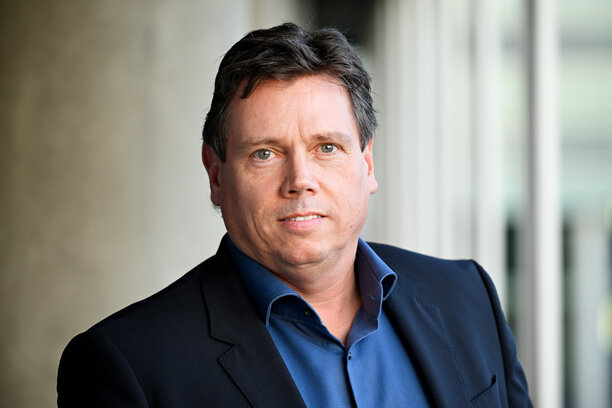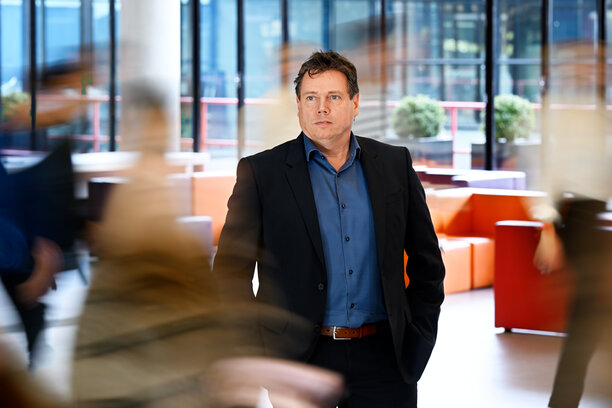A catalyst for connection in a growing department
Patrick Anderson is one of three new deans appointed on September 1st to the departments of Applied Physics & Science Education, Mechanical Engineering, and Mathematics & Computer Science. We find out more about these new leaders in a three-part series.
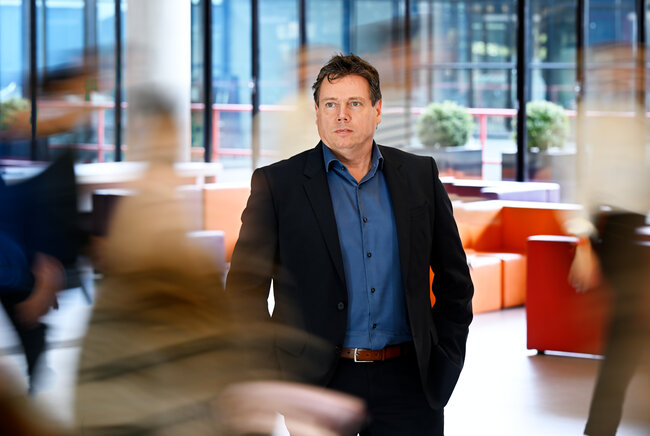
Keeping his people connected: that is one of the most significant challenges facing the new Mechanical Engineering department dean, whose people will be spread throughout the campus over the next few years due to the remodeling of the Gemini building. But, more than anything, Patrick Anderson wants to be an approachable dean who acts openly and transparently.
As a child, Patrick Anderson (54) never imagined he would become a dean. Or even end up in the field of science at all. Yet that is exactly what the full professor of Structure and Rheology of Complex Fluids has been since September 1st: dean of the Mechanical Engineering department. “I was greatly honored when the search committee’s chair approached me in May. It seems there was a lot of support among colleagues for me as dean, and I promised to think about it. After all, it’s a different kind of position than being a professor, a job I genuinely enjoy,” Anderson says.
When you get offered a position like that, it gets you thinking: you reflect on the past and look ahead to the future. “I’ve been contributing to science for more than 20 years: bringing in projects, supervising PhDs, writing papers. We’ve had great successes, and I’ve built an international reputation with my polymer processing and rheology research. I’ve always been passionate about teaching, too, winning several teaching awards. I love lecturing to first-year students and always try to stimulate as much interaction as possible.”
Until retirement
“I could’ve easily kept doing that until I retire,” Anderson muses. “But I also enjoy sharing what I’ve learned during my academic career with the people in the department. Both the academic and support staff, because I strongly believe that together they make the university better.”
His answer to being asked if he would like to become the dean of Mechanical Engineering was, therefore, ‘yes’. Running it, while doing a bit of research and teaching, “I’ll eventually scale back my role in the capacity group to 20% of my time. I’ll keep mentoring young scientists and ensuring they can do their research as best they can. And I’ll continue teaching the first-year Introduction to Mechanical Engineering course. I want to stay connected to the students.”
I want people to know I’m approachable. Feel free to visit my office.
Dean Patrick Anderson
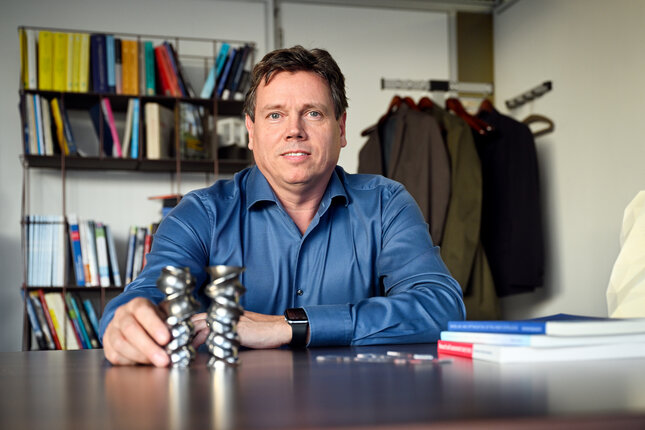
At the end of the interview, Anderson asked for tips to help him in his new role as dean. The answer? ‘Stay human and pay attention to your people.’ And Anderson certainly intends to do that. He wants his deanship to radiate openness and transparency. “I want people to know that I’m approachable. Whether you have a complaint or a compliment, feel free to visit my office. If my door’s open, you’re welcome to come in.”
Those will be two doors for the next while, since the Mechanical Engineering Department’s management team has relocated from the Gemini building - it is being remodeled - to the Traverse building. The department’s ESA (education support) department, among others, also moved. Anderson now divides his time between the two buildings. Over the next few years, his department’s staff and labs will temporarily be dispered in different parts of the campus.
Concerns
So, unsurprisingly, Anderson is putting considerable effort into finding and maintaining connections. “Our people have a positive attitude; I think we’ll get through this, but it does concern me a bit,” he admits. “I’ve already noticed that it’s sometimes a little hard to connect in Traverse. For example, between us, as management on one side of the corridor and ESA employees on the other. The only thing we share is the elevator. I think it’s important that we get to know each other better.”
I don’t believe you need more meetings to see each other
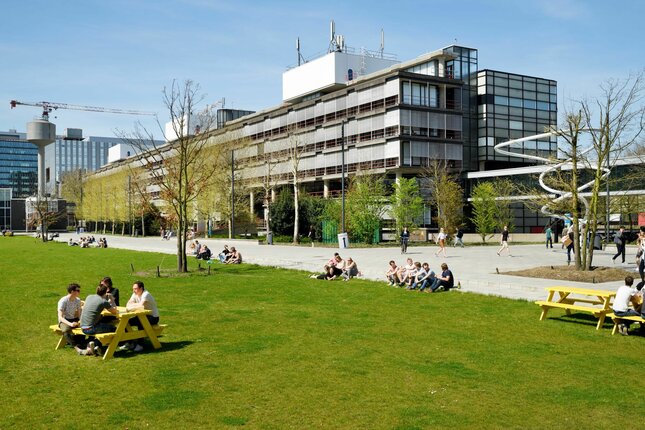
Informal gatherings
Anderson, coming back to his role as a catalyst within the department: “It’s essential for motivation and collaboration to see each other informally, outside of meetings, as well. Everyone in our department is passionate and enjoys their work. My job is to create an environment where our people can function at their best. And make connections among themselves that allow them to get more out of their jobs. I’m not someone who wants to stay on top of things. Remove me, and the process must continue.”
You are not necessarily a good leader because you are a good scientist. Of that, Anderson is all too aware. “It’s vital to refresh your leadership knowledge and skills from time to time. I’ve indicated that I’m open to that once there’s room in the leadership program again.”
Sometimes, you must go the extra mile to ensure people feel safe and comfortable.
Another course he deems important is regarding social safety. Anderson wants all his department members to take it. “We must be aware that not everyone automatically feels ‘safe’. Sometimes you have to go that extra mile to make sure people feel comfortable. That’s just as important as picking up on signs that people don’t feel safe,” Anderson says. “If people cross a line, you must take action and start the conversation. That can happen anywhere: via e-mail, Whatsapp groups, between students, and with staff. I urge everyone to speak up if you feel something’s inappropriate,” Anderson stresses.
A while back, Anderson heard that students in his department no longer wanted to walk past the Neuron building. The construction crew working there were catcalling and shouting comments at them. “You can downplay that, but I took it seriously.” Anderson sent an e-mail about the situation to Real Estate, who commissioned the campus building’s renovation. “I asked them to take this up with the contractor. Real Estate took it seriously and spoke with the contractor, who sent back a courteous letter. This issue is now addressed at the weekly construction site work meetings. We’ve let those who reported this behavior know what had been done.”
The future
Mechanical Engineering has a bright future, says the dean. “We have good courses and research and get plenty of funding from second and third financial streams. We do need more staff to improve the student-staff ratio. That’s not currently balanced; the workload’s too high.”
And that is where the scale jump the university is preparing for comes in. Mechanical Engineering master’s programs are one of the areas where the biggest leap is being sought.
No whinging, just getting on with it: that’s what characterizes our department.
Anderson wants to involve all the department’s divisions in this growth plan. “We recently held productive talks, which yielded highly creative ideas about getting this done. Our department has always been progressive. We don’t whinge; we just get things done. But we also consider the risks and want to maintain excellence and independence. The conditions the university has set for expansion are crucial. We can’t grow without pre-funding to hire more staff.”
These are the four conditions the university has set for growth:
-
Up-front government funding to facilitate growth and to prevent the current workload from increasing further.
-
Growth should not come at the expense of excellence.
-
Growth should be gradual to keep the workload manageable.
-
The region must ensure that the infrastructure and facilities are in order.
War on talent
“It’s certainly not easy to find good people,” says Anderson. “I don’t believe in using recruitment websites. You have to approach people personally and proactively.” The dean asks his staff who attend conferences - “luckily that’s possible again” - to keep their ears and eyes open for suitable talent for their department. “If they submit names to me, I get to work. It can only lead to something good if the department dean calls you, saying you could be a nice addition to his department.”
Shorter procedure
To act quickly when talent presents itself, Anderson recently had the procedure to appoint an assistant professor shortened to two days. “That’s how we managed to bring in a talented Spanish researcher. She gave a seminar here and then left for MIT for four months. Our people attended that seminar and could, thus, evaluate her. There would usually be a nomination committee, but to speed things up, we did things differently that time. Naturally, we talked to her too and agreed to consider her career development at a later date. After considering it for a fortnight, she accepted a position here,” Anderson says with satisfaction.
Expanding their student and staff pools will largely be done from outside the Netherlands. “That also requires something of us. Not only language-wise, but also in the way we communicate. Here, openness and transparency are important. You have to be aware that people may misinterpret what you mean.”
Retaining people is even more important than attracting them.
At the same time, that demands a new way of thinking, of guiding people. “We can’t only ask people how we can help them when they’ve just joined us; we must do so continuously. ‘How are you doing? What issues are you running into?’ That should become built-in for us all. Because retaining people is even more important than attracting them. Our department and university must offer a working atmosphere where everyone feels at home.”
More on our strategy
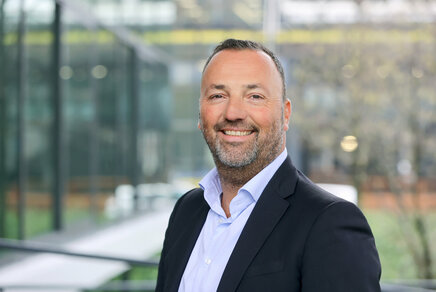

![[Translate to English:] [Translate to English:]](https://assets.w3.tue.nl/w/fileadmin/_processed_/c/f/csm_BvOF_2024_0319_AEV_license_TUe_Dirk_van_Meer_-_CORE_1__c976e259a5.jpg)
